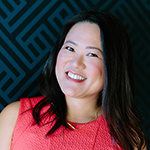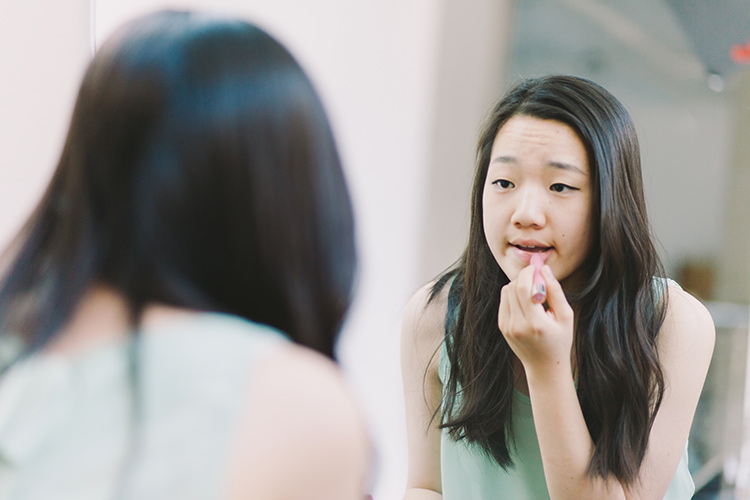Eyelids. There’s not a more tricky topic when it comes to Asian beauty standards (except maybe skin color). So I was intrigued to find out that Seattle filmmaker Jade Justad, who is herself mixed-race Korean-white, is producing a short film called Creased, which focuses on a teenager’s interest in Asian eyelid surgery to attain the folded lids so prized by many. I recently had a chance to chat with Jade.
HapaMama: Could you tell me a little bit about yourself, your ethnic and professional background and why you decided to embark upon this film about Asian double-eyelid surgery?
Jade Justad: I was a shy and serious child and theater was a great outlet for me. I loved it so much I decided to become an actress. I graduated from Boston University with a B.F.A. in Acting. After graduation I spent some time in New York attempting a career at acting for about a year before I realized that the business of being an actor (and an actress of color to boot) brought me a lot of anxiety and frustration. I wanted to be able to exert more control in my career, so I came home to Seattle and began writing and directing short films, music videos, web-series, etc. I found being behind the camera far more compatible with my personality. Now I strive to create a balance between my personal narrative films and directing and producing commercial video content.
When I was thirteen I went to a make-up counter with several friends that were white. The make-up artist at the counter did everyone’s make up first and then she approached my face with some hesitation. She pondered a bit before making some suggestions to “open up” and “westernize” my eyes. I suddenly felt like there was something wrong with my eye shape and that moment has always stuck with me. My eye crease in both eyes has become more pronounced (as is fairly common, my creases were not the same size and my eyelid shape changed during puberty.) I find it interesting that I was happy/relieved that the creases became bigger.
One of the inspirations for this film is Julie Chen’s story. On “The Talk” she revealed that she had the surgery early on in her news career because her bosses told her she needed it in order to appeal to a larger audience. She had the surgery and her career flourished. What I found just as interesting as her story were the reactions of her non-Asian co-anchors. When before and after pictures were shown, they largely praised her for how she looked in the after photo, saying she did look alert, etc. Their reaction is very troubling to me. Chen was receiving confirmation once again that she was right to change a very distinctly Asian feature in order to homogenize and gain entrance to mainstream media.
HM: When I first heard about your project, my immediate assumption was that it was a documentary film. But I see that is actually a scripted film featuring a Asian American high school girl who wants to get the eyelid surgery. Why did you choose this format to tell this story?
JJ: There are several reasons I chose to make this a scripted film. First of all, I am a narrative film director at heart so that is the format that I always gravitate towards. Second, I have seen some documentary projects on the subject so I thought a different medium would bring some fresh perspective. Three, there is always a presentational quality to documentaries for me (and I love documentaries!) and I’m looking for very intimate and selective moments. I chose to make the film about an 18 year old because that is a very challenging time in a young woman’s life. She is on the cusp of adulthood and very aware of how she is presenting herself to the world. As I get older I care less and less about what people think of me, but when I was 18 my confidence was a house of cards. I think this is a great age to explore on film – the bravado and vulnerability of this time in a person’s life is fascinating.
HM: As a mixed-race Asian woman, what particular perspectives do you bring to this issue?
JJ: I grew up in a mostly white community that was progressive, but nevertheless I felt very aware that there was something “different” about me. I would be hanging out with friends and I wouldn’t be thinking about race at all, I would just feel like one of the girls until out of the blue someone would make an Asian joke or something to that effect and I was suddenly very very conscious of the fact that I was the only person of color in the room. And I would feel very alone. This is a story that I have heard from many many POCs that also live mostly outside of their ethnic strongholds. I think additionally as a mixed race woman I felt very caught in-between cultures and identities. I used to really identify with my white heritage and frankly I just wished I were white, especially because I was an actress. The lead character of CREASED is full Asian, but she also feels lost and wonders if she would be happier if she were white because she doesn’t have many Asian faces in her life. I learned as a hapa I can’t pick one race over another nor can I deny any part of myself. I think that’s a journey that a lot of young mixed-race Americans have to go on. Now I have a lot of pride in my “Koreaness” :)
HM: What are the challenges in funding a project like this and what are your financial needs at this point?
JJ: There is no financial incentive to making a short film so it’s hard to find investors. This is a film that I want to screen nationally at festivals, etc. because I think it touches on some issues that we, especially APIs, need to talk about openly.
I was lucky to receive a grant from 4Culture which is an organization that funds local artists. I also have found support from the Japanese American Citizen’s League -Seattle. The costs of making even a short film are high especially if you want to achieve a professional level looking film. I have a team of professional crew that are donating their normally very expensive time, which helps a great deal, but there are still lots of hard costs. I am looking for funding right now to get the film through post-production (music, color grading and sound editing) and then for the release (festival feels, press materials, duplication, etc.) This is why I have turned to kickstarter for the first time and what I can say from what I’ve learned so far from crowd-funding is that every dollar counts. Every donation, no matter how small is deeply appreciated!
Want to donate to Creased? Visit Kickstarter to give $5 or more to make this film a reality…


